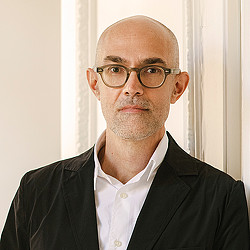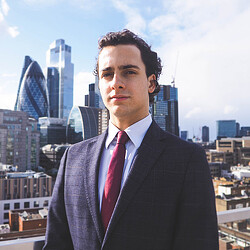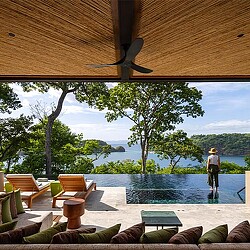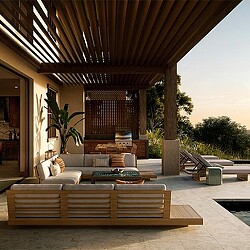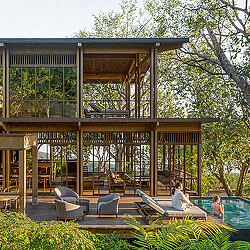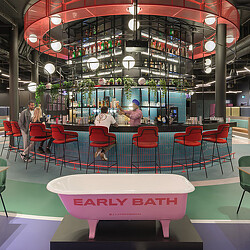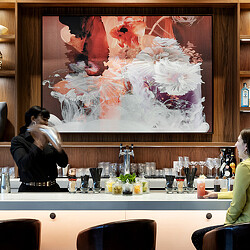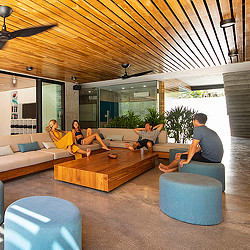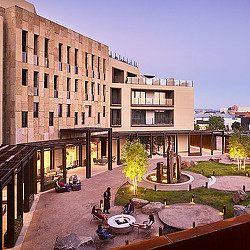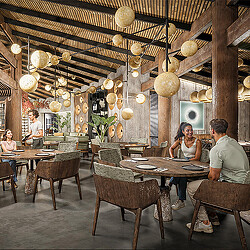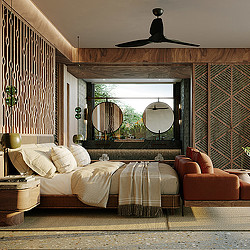Designing an Eco-Retreat in Costa Rica’s Rainforest
Gensler Paris’ Managing Director explores how hospitality trends influence the design of this new Costa Rican resort — from the demand for cultural immersion to the rising appeal of slow travel.
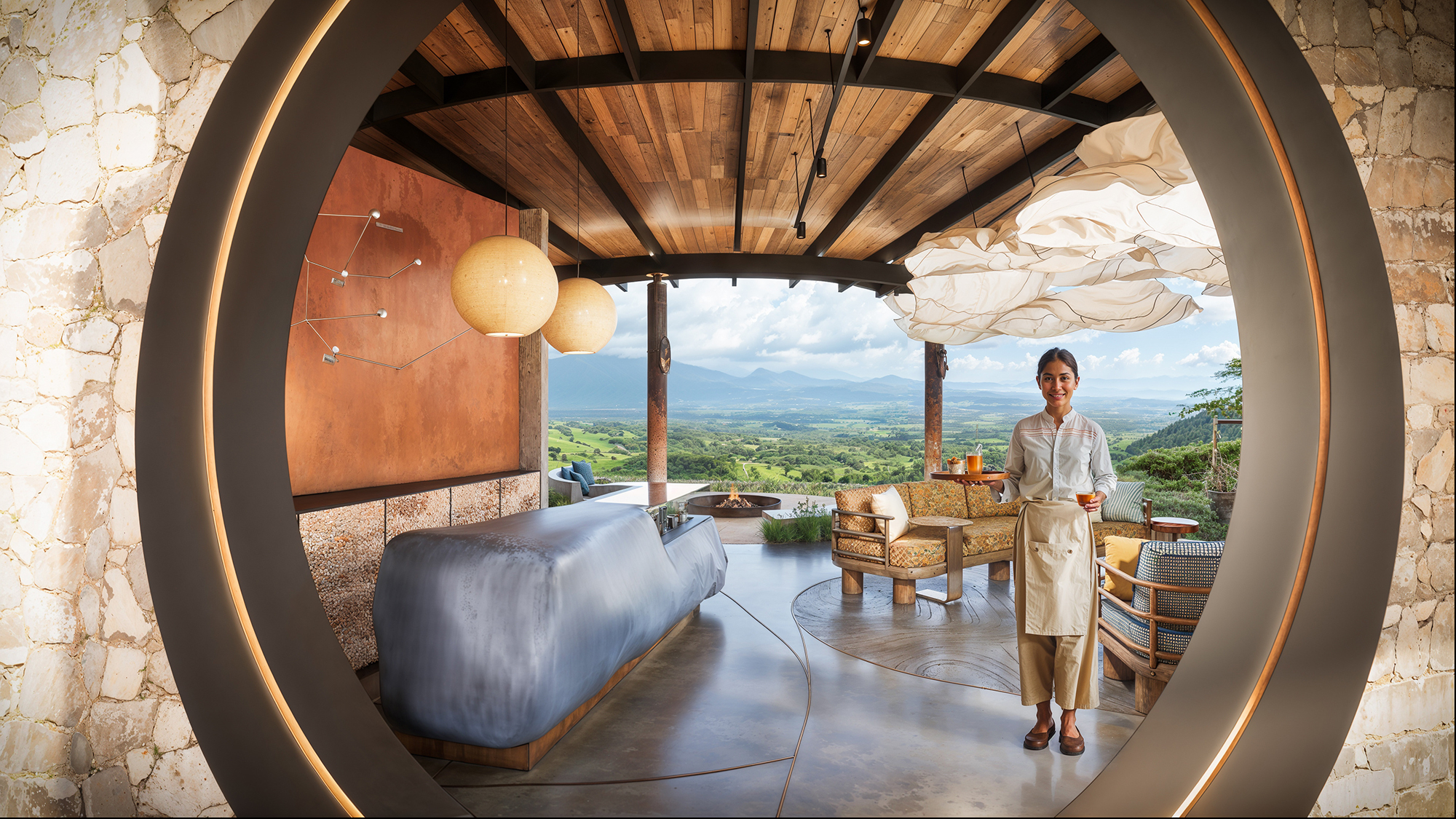
The global ecotourism market is expected to reach nearly €670 billion by 2032, according to Fortune Business Insights. Sustainable tourism is on the rise, as travellers seek hotels and lodging that can preserve natural resources, reduce waste and carbon emissions, and provide locals with opportunities to preserve their local culture, while safeguarding natural heritage and biodiversity.
Today’s travellers are looking for more than just a place to stay; they are looking for gateways to local heritage, untouched landscapes, and a slower, more intentional way of travel. This shift challenges designers to blend comfort with conservation, innovation with tradition, and exclusivity with a genuine connection to place.
The ORIGINS Astral Luxury Lodge, an eco-retreat located in Costa Rica’s northern rainforest, designed by Gensler in collaboration with local architect Mario Aviles and the Indigenous Maleku tribe, demonstrates how architecture is responding to these shifts.
Alexandre Brunstein, a strategist in Gensler’s Paris office, sat down with Gensler Paris’ Managing Director, Philippe Paré, to explore how this new destination embodies many of the global hospitality trends we’re tracking, from the demand for cultural immersion to the rising appeal of slow travel, the fusion of nature and hospitality, and the role of personalisation and technology.
Alexandre: In hotel design, immersive experiences create a more meaningful and memorable stay, ensuring that every element — from architecture to dining — reflects the soul of the destination. How do you incorporate local craftsmanship, materials, and storytelling elements into the design of a hotel to create a space that feels genuinely rooted in its local culture?
Philippe: There are some incredibly simple, yet powerful, ways in which we can incorporate local culture in hospitality design, and we have a few wonderful examples of this in the ORIGINS Astral Luxury Lodge, which will open to the public in November. The lodge was founded by a French entrepreneur who was inspired to transform the property into a luxury lodge while preserving the natural beauty of the surrounding rainforest.
To develop the interior design, our Costa Rica team spent time with members of the local Maleku community, learning about their way of life, their intricate crafts, and vibrant traditional colours. This experience allowed us to better integrate the essence of the Maleku people into the design concept, resulting in an authentic space inspired by their rich heritage.
The team also engaged the wider community in the design process, seeking out craftsmen to fabricate custom-designed pieces of furniture using locally sourced wood. In fact, more than 80% of all the furniture and equipment within the hotel was crafted at the ORIGINS Lodge workshop on the property. Makers were also employed to create handmade decorative objects throughout the lodge, ensuring that every element of the guest experience feels authentic to the place.
This integration of local culture is not only embedded in the design but also in the hotel’s culinary offering. Guests can enjoy a farm-to-table dining experience at El Cosmo, the lodge restaurant, where they can explore the garden where the produce is grown. This type of holistic offering enhances the connection between guests and their surroundings, fostering a deeper appreciation for a country’s heritage.
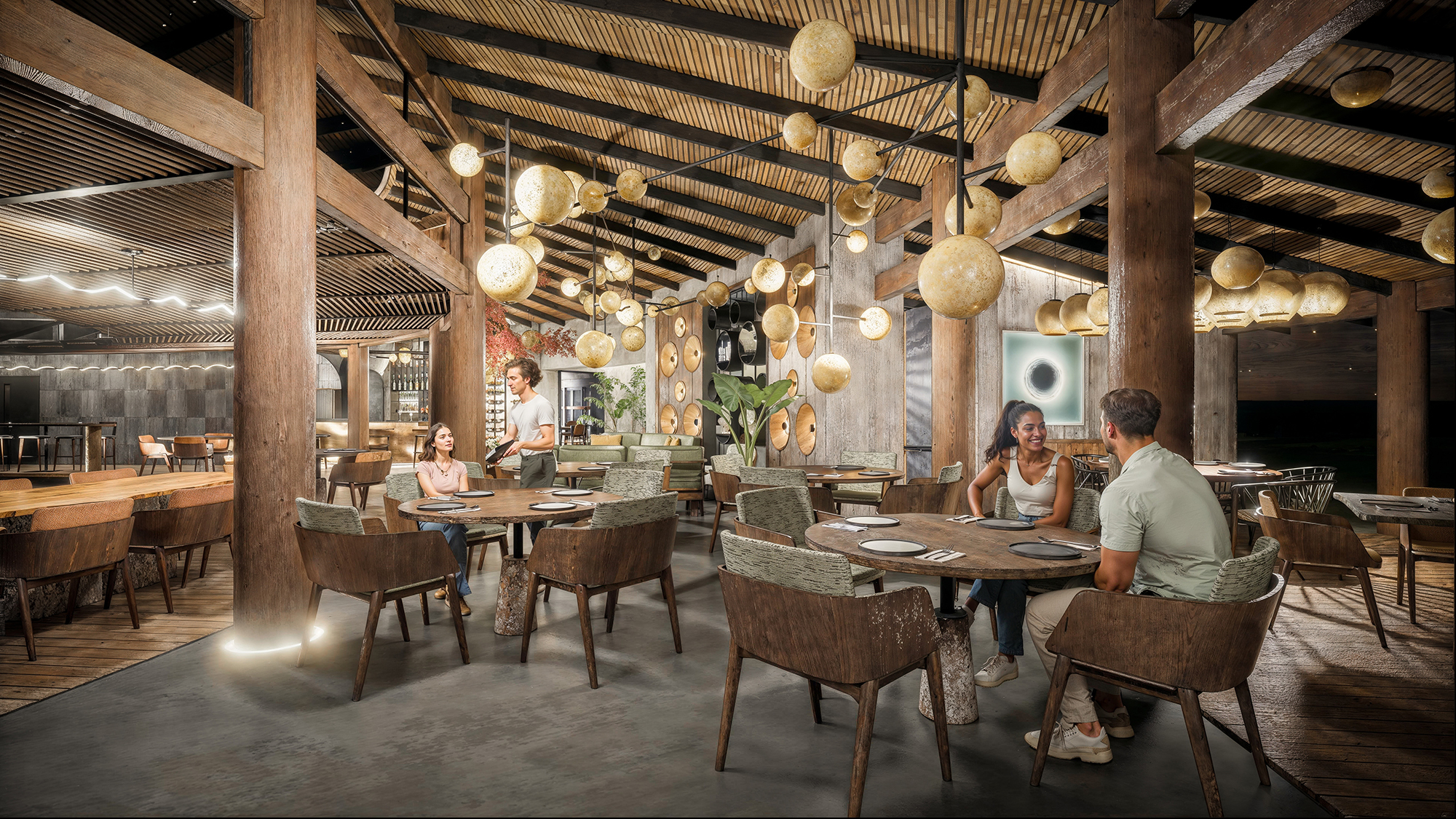
Alexandre: The allure of untouched landscapes is stronger than ever, with travellers seeking deep sensory connections to the natural world. To create an immersive experience connected to nature, hotel design should blur the boundaries between indoors and outdoors and seamlessly integrate the surrounding environment. How do you design a hotel to enhance this experience?
Philippe: The first consideration should be the location of the site. Thoughtful placement of structures to maximise views, natural light, and ventilation ensures harmony with the surroundings. Emphasising local topography, native vegetation, and natural water features allows guests to engage with the landscape while minimising environmental impact.
Other design considerations, such as opening rooms to the outside and creating outdoor spaces that become physical extensions of the hotel itself, also play a role. The wider site master plan could also be designed to bring nature closer to guests through the creation of modern villa accommodations instead of the traditional super block hotel.
At the ORIGINS Astral Luxury Lodge, our team worked with the client to infuse the design of seven villas to accommodate families, groups of friends, intimate weddings, or wellness retreats. Perched 800 meters high in the mountains, the lodge is located between the Miravalles and Tenorio volcanoes with breathtaking 360-degree views stretching all the way to Lake Nicaragua, offering guests a truly immersive and sensory-rich dive into the natural world.
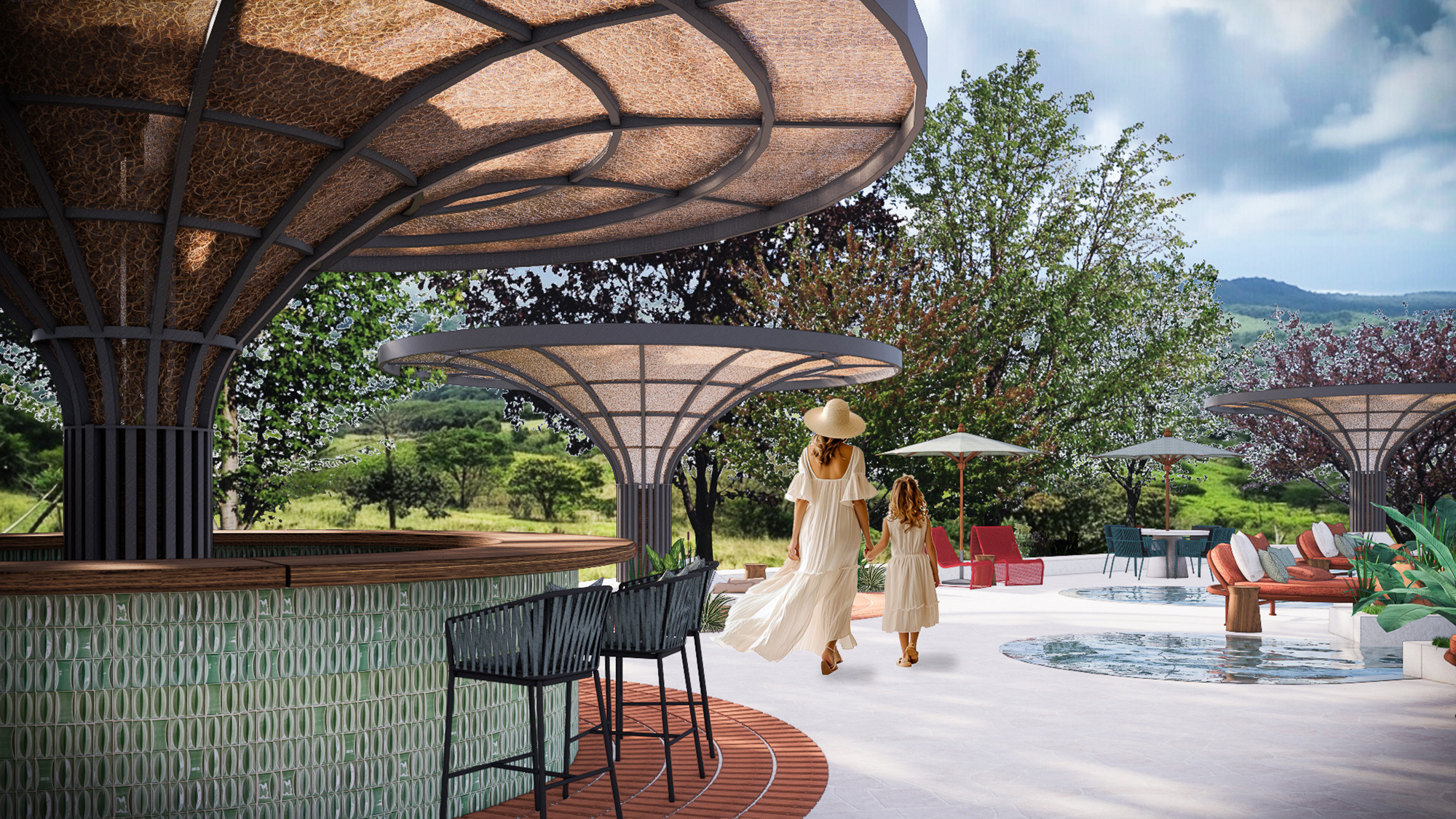
Alexandre: Slow travel has become a mindset — a desire to savour moments rather than rush through destinations. To encourage slow travel through design, we focus on creating spaces that naturally invite guests to slow down, reflect, and connect with their surroundings. What architectural or experiential elements do you incorporate to encourage reflection, relaxation, and an unhurried appreciation of the environment?
Philippe: Wellness and relaxation should be seamlessly woven into the hospitality experience rather than treated as an add-on. A variety of environments —from quiet, secluded retreats to more social, engaging spaces — allow guests to move at their own pace, depending on their mood and needs.
Slow travel design should also consider neurodiverse needs, including elements like colour, sound, and sensory engagement (or intentional minimalism) to support different ways of experiencing relaxation. Additionally, we’re starting to see a “less is more” approach gain traction, where guests prioritise meaningful experiences over excess amenities.
This could mean reducing reliance on technology, minimising air conditioning in favour of natural ventilation, or designing spaces that promote a deeper connection to nature and oneself, disconnecting from the rest of the world.
Our team envisioned the ORIGINS Astral Luxury Lodge as an intimate sanctuary that encourages relaxation and rejuvenation and offers spaces that encourage both solitude and togetherness, allowing guests to fully embrace nature and meaningful connections. Ultimately, slow travel design is about crafting environments that encourage presence, mindfulness, and a personalised sense of retreat.
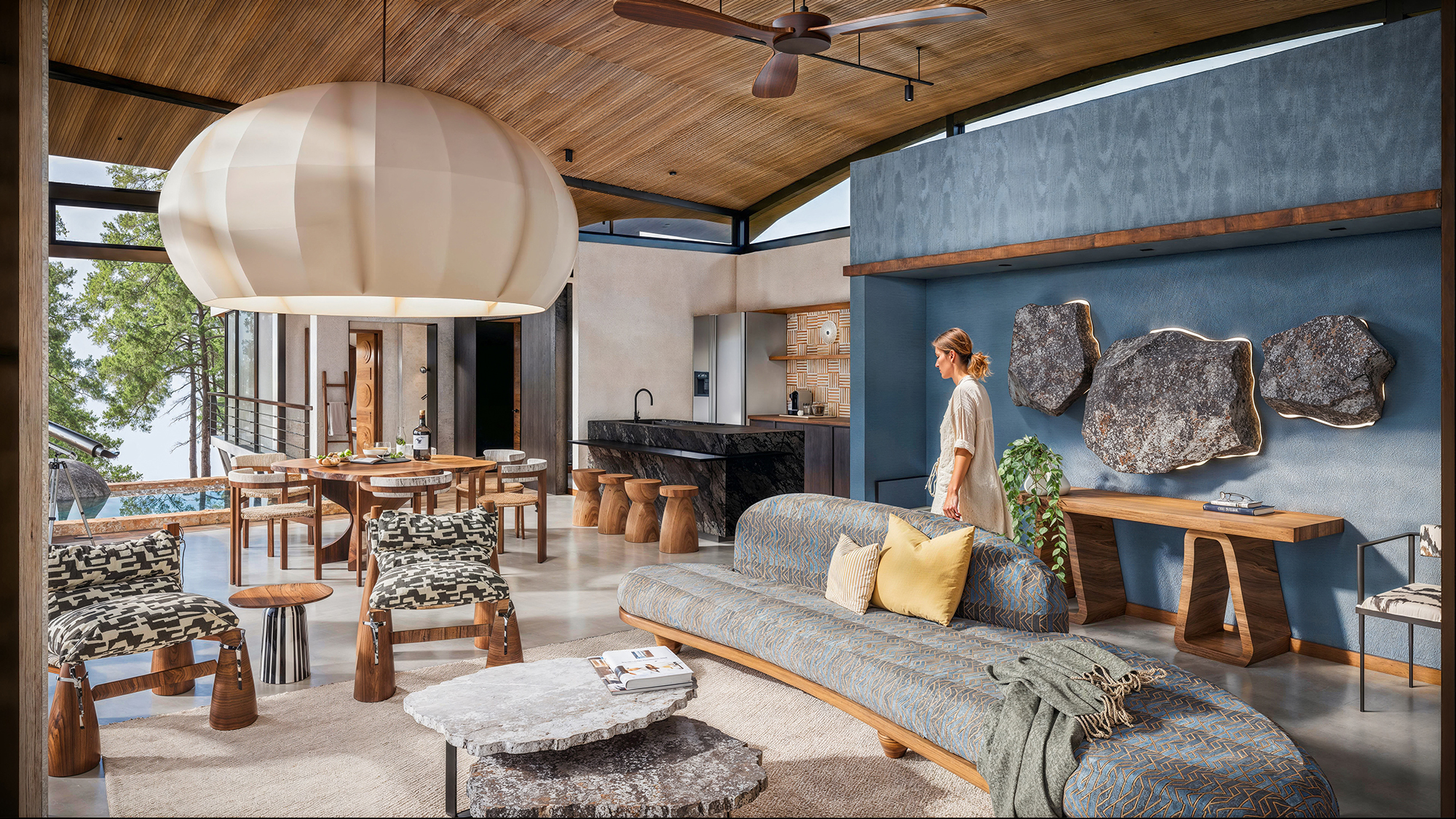
Alexandre: While high-end travellers seek hyper-personalised experiences, they also crave seamless, intuitive design that feels effortless rather than intrusive. At its best, technology in hospitality is intuitive, seamless, and nearly invisible, enhancing rather than overshadowing the guest experience. How do you integrate technology or adaptable design elements that cater to individual preferences while maintaining a sense of authenticity and warmth?
Philippe: The most effective applications allow guests to personalise their environment, effortlessly adjusting lighting, temperature, and ambience to suit their mood while maintaining a sense of warmth and authenticity.
Lighting also plays a key role in shaping the atmosphere, and smart systems can adapt throughout the day to create a more natural and immersive experience. Similarly, personalised audio settings offer another layer of customisation, allowing guests to curate their own sensory environment. Beyond the room, technology can serve as a virtual concierge, providing tailored recommendations, curated itineraries, and seamless navigation within and beyond the hotel.
The ability to anticipate guest preferences also creates a sense of familiarity and comfort. Arriving at a destination to find personalised touches — whether it’s preferred room settings, favourite drinks, or customised experiences — bridges the excitement of travel with the ease of home, allowing guests to relax and immerse themselves fully.
Alexandre: The Blue Mind Theory suggests that water has a calming effect on the human brain. How can hotel design encourage a more mindful interaction with its natural environment, particularly in relation to water features like rivers and lakes?
Philippe: To foster a mindful interaction with water, ORIGINS Astral Luxury Lodge is strategically positioned to overlook Lake Nicaragua. The design balances proximity and perspective, ensuring guests always feel the presence of water — whether through sweeping vistas or carefully placed viewpoints on private plunge pools or the iconic, stellar laguna-shaped main swimming pool visible from the restaurant. Throughout the lodge, water is not just a backdrop but an integral part of the experience, encouraging both visual contemplation and physical engagement.
This approach is about more than just aesthetics — it’s about creating a journey of discovery. Views of the lake are ever-present, but direct access is offered in a way that feels intentional rather than immediate. Guests are invited to engage with nature on their own terms, with different layers from the sky, the pools, the valley, and the lake, creating a striking balance between serenity and immersion, where water is always within reach yet retains its sense of wonder.
For media inquiries, email .
Concevoir une écolodge dans la forêt tropicale du Costa Rica
Le Directeur Général de l’agence parisienne de Gensler explore comment les tendances actuelles de l’hôtellerie influencent le design de ce nouveau complexe costaricien — de la quête d’authenticité culturelle à l’engouement croissant pour le ‘slow travel’.

Selon Fortune Business Insights, le marché mondial de l’écotourisme devrait atteindre près de 670 milliards d’euros d’ici 2032. Le tourisme durable connaît un essor remarquable, les voyageurs priorisant les hébergements capables de préserver les ressources naturelles, de réduire les déchets et les émissions de carbone, tout en valorisant les cultures locales et en protégeant le patrimoine naturel et la biodiversité.
Les touristes d’aujourd’hui ne cherchent plus seulement un lieu où dormir ; ils aspirent à des expériences authentiques, à des paysages préservés et à une manière de voyager plus lente et plus intentionnelle. Cette évolution pousse les architectes à marier confort et conservation, innovation et tradition, exclusivité et immersion locale.
L’ORIGINS Astral Luxury Lodge, une écolodge nichée dans la forêt tropicale du nord du Costa Rica, conçu par Gensler en collaboration avec l’architecte local Mario Avilés et la communauté indigène Maleku, illustre parfaitement la manière dont l’architecture répond à ces nouvelles attentes.
Alexandre Brunstein, stratégiste au sein de l’agence parisienne de Gensler, s’est entretenu avec Philippe Paré, Directeur Général de Gensler Paris, pour discuter de la façon dont cette nouvelle destination incarne plusieurs grandes tendances de l’hôtellerie mondiale, allant de la recherche d’immersion culturelle à la montée du ‘slow travel’, en passant par la fusion entre nature et hospitalité, et le rôle que la technologie peut jouer en termes de personnalisation.
Alexandre : Dans l’architecture des hôtels, les expériences immersives rendent les séjours plus riches et mémorables, en veillant à ce que chaque élément — du design à la gastronomie — reflète l’âme du lieu. Comment intégrez-vous l’artisanat local, les matériaux et les récits culturels locaux pour créer un hôtel réellement ancré dans son territoire ?
Philippe : Il existe des façons très simples mais puissantes d’ancrer un projet hôtelier dans la culture locale. Nous en avons de très beaux exemples avec l’ORIGINS Astral Luxury Lodge, qui ouvrira ses portes au public en novembre. Cette écolodge a été créé par un entrepreneur français, animé par le désir de transformer cet endroit en un lieu d’exception tout en préservant la beauté naturelle de la forêt environnante.
Pour concevoir l’intérieur, notre équipe au Costa Rica a passé du temps avec la communauté Maleku, découvrant leur mode de vie, leurs savoir-faire et leurs couleurs traditionnelles vibrantes. Cette immersion nous a permis d’intégrer l’essence de leur culture dans la conception du lieu, créant un espace authentique, imprégné de leur riche patrimoine.
Nous avons également sollicité la communauté élargie pour fabriquer du mobilier sur mesure à partir de bois locaux. En effet, plus de 80 % des meubles et équipements de l’hôtel ont été conçus dans l’atelier de l’écolodge même. Des artisans ont également été engagés pour créer des objets décoratifs faits main, renforçant encore le caractère unique et authentique de l’expérience.
Cette intégration culturelle ne s’arrête pas à la décoration : elle se retrouve aussi dans l’offre culinaire. Les hôtes peuvent profiter d’une expérience "de la ferme à l’assiette" au restaurant El Cosmo, et même visiter le potager où sont cultivés les produits qu’ils consomment. Cette approche holistique renforce le lien entre les visiteurs et leur environnement, tout en favorisant une véritable appréciation du patrimoine local.

Alexandre : L’attrait pour les paysages vierges n’a jamais été aussi fort : les voyageurs recherchent des connexions sensorielles profondes avec la nature. Pour créer une expérience immersive, il faut brouiller les frontières entre l’intérieur et l’extérieur. Comment concevez-vous un hôtel pour favoriser cette relation avec l’environnement naturel ?
Philippe : Tout commence par le choix de l’implantation. Positionner intelligemment les structures permet d’optimiser les vues, la lumière naturelle et la ventilation, en harmonie avec le paysage. Mettre en valeur la topographie locale, la flore indigène et les éléments d’eau naturels permet aux visiteurs d’interagir avec leur environnement tout en limitant l’impact écologique.
D’autres choix de design — comme des chambres largement ouvertes sur l’extérieur ou des espaces extérieurs conçus comme des extensions de l’hôtel — renforcent cette immersion. L’aménagement global du site peut aussi privilégier des villas modernes et indépendantes plutôt qu’un hôtel traditionnel en bloc compact.
Au sein de l’ORIGINS Astral Luxury Lodge, nous avons conçu sept villas adaptées à différents types de séjours : familles, amis, mariages intimes ou retraites bien-être. Perché à 800 mètres d’altitude, entre les volcans Miravalles et Tenorio, l’écolodge offre une vue panoramique exceptionnelle jusqu’au lac Nicaragua, pour une immersion totale et sensorielle dans la nature.

Alexandre : Le ‘slow travel’ est devenu un état d’esprit : prendre le temps, savourer chaque instant, se reconnecter à l’essentiel. Comment le design architectural peut-il encourager cette forme de voyage plus lente et réfléchie ?
Philippe : Le bien-être et la détente doivent être au cœur de l’expérience hôtelière, et non un ajout secondaire. Il faut offrir une diversité d’espaces — du plus intime au plus social — pour que chacun puisse évoluer à son propre rythme.
Le design du ‘slow travel’ doit aussi prendre en compte la neurodiversité : couleur, son, ambiance sensorielle (ou au contraire, minimalisme volontaire) doivent s’adapter aux différentes sensibilités. On observe aussi une montée en puissance du « moins mais mieux » : les voyageurs préfèrent les expériences qui ont du sens à une surenchère de services.
Cela peut se traduire par une technologie discrète, une ventilation naturelle plutôt que la climatisation, ou des espaces propices à la reconnexion à soi et à la nature, loin du tumulte extérieur.
L’ORIGINS Astral Luxury Lodge a été imaginée comme un sanctuaire intime, propice au calme, à la reconnexion, avec des lieux pensés autant pour la solitude que pour les moments partagés. L’idée est de favoriser la pleine présence, la contemplation, et une forme de retraite personnalisée.

Alexandre : Les voyageurs haut de gamme recherchent des expériences ultra-personnalisées, mais souhaitent aussi un design fluide, intuitif, presque invisible. Comment intégrer la technologie ou des éléments adaptables sans perdre l’authenticité du lieu ?
Philippe : Les solutions les plus efficaces sont celles qui permettent aux hôtes d’ajuster leur environnement selon leurs préférences — lumière, température, ambiance — tout en conservant chaleur et simplicité.
La lumière joue un rôle central. Des systèmes intelligents peuvent évoluer au fil de la journée, créant des atmosphères naturelles. Le son personnalisé est un autre levier intéressant, permettant à chacun de composer son univers sensoriel.
Au-delà de la chambre, la technologie peut servir de concierge virtuel, suggérant des activités, des itinéraires ou facilitant l’orientation sur place. L’anticipation des préférences renforce aussi l’impression d’être attendu : retrouver sa boisson favorite, un parfum familier ou des petites attentions personnalisées transforme l’arrivée en une expérience agréable, entre surprise et confort.
Alexandre : La théorie du ‘Blue Mind’ suggère que l’eau a un effet apaisant sur le cerveau humain. Comment un hôtel peut-il encourager une interaction consciente avec les éléments aquatiques comme les rivières ou les lacs ?
Philippe : La lodge ORIGINS Astral est orientée pour offrir une vue saisissante sur le lac Nicaragua. L’eau y est omniprésente, non comme décor passif, mais comme élément central de l’expérience — depuis les piscines privées jusqu’à la lagune principale en forme d’étoile, visible depuis le restaurant.
L’idée n’est pas d’imposer un contact immédiat avec l’eau, mais de créer une progression, une découverte. Le lac est toujours visible, mais l’accès se fait de manière volontaire et mesurée. C’est cette distance maîtrisée qui donne à l’eau toute sa puissance émotionnelle.
L’ensemble de l’expérience repose sur une immersion sensorielle en strates : le ciel, les bassins, la vallée, le lac… L’eau est toujours présente, mais conserve son mystère. Un équilibre subtil entre contemplation et immersion.
Pour toute demande presse, veuillez écrire à .
